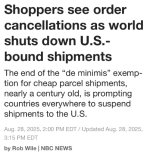
U.S. shoppers ordering smaller goods from abroad are being met with waves of cancellation notices ahead of a key trade rule change ordered by the Trump administration.
On Friday, the United States will end the nearly century-old de minimis exemption, which allowed items worth less than $800 to be shipped to the country duty-free, or without having to pay any tariffs.
In advance of the official termination date for the exemption, many European nations, alongside Australia, India, Japan, South Korea, Taiwan, Thailand and New Zealand, have announced temporary suspensions of U.S.-bound shipments.
On Thursday, Mexico's postal service announced it was temporarily suspending package deliveries to the U.S. due to the pending changes in the de minimis rule. Oh well.
Shoppers see order cancellations as world shuts down U.S.-bound shipments — NBC News
The end of the “de minimis” exemption for cheap parcel shipments, nearly a century old, is prompting countries everywhere to suspend shipments to the U.S.
Several Countries Suspend Postal Shipments To The US—Here’s Why — Forbes
The de minimis exemption, which allowed imported packages worth less than $800 to enter the U.S. without facing any duties, will end for all countries on August 29.
Online auction site eBay has likewise warned that sellers who rely on foreign postal services may have to find alternative shipping processors to get their products to U.S. customers. On Thursday, Canada Post said it had contracted with a third-party duty processor to keep parcels flowing into the U.S.
While foreign postal systems have no problem making deliveries to the U.S., they don’t have systems in place to process a tariff and pay it into the U.S. Customs and Border Protection, Layfield said.
In essence, the Trump administration is now asking foreign mail carriers to act as import tax collectors on behalf of the U.S. government — something they are not set up to do, or may be refusing to do, she said.
“Why would a foreign post collect from a local business for a foreign country’s customs?” Layfield said. ”It’s not something that anyone has done before.
Over 30 countries suspended or restricted shipments to US. Here's a list. — USA TODAY
The pauses are in response to President Donald Trump's decision to end a trade agreement that for years allowed low-value packages to avoid duties.
While many countries offer some form of a de minimis exemption, Washington’s level became an outlier. Over time, the values grew. By 2015, it was $200, with roughly 134 million de minimis parcels entering the U.S. A year later, the limit rose to $800, and 220 million packages flooded in, and by last year, a whopping 1.36 billion units arrived.
Now the US can go from feast to famine?
Trump killed a tariff exemption for small shipments and now Canadian businesses are scrambling — National Post
Thousands of entrepreneurs are looking for U.S. warehouse space, but they’ve only been given a few weeks
